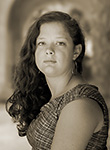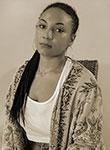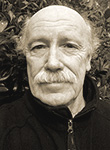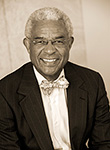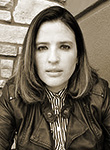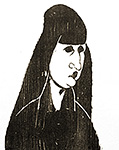This fall marks Blackbird’s seventeenth Levis Remembered, which calls attention to the work of Larry Levis and recognizes Kaveh Akbar, winner of the twenty-first annual Levis Reading Prize.
Included in this year’s reading loop are three Levis poems, “Fish,” “Ghost Confederacy,” and “Winter Stars,” all of which at some point gaze at the night sky as they aim for some navigational guidance in a world bound by time and mutability. Gregory Donovan addresses these poems in his annual reconsideration of some aspect of Levis’s work, calling attention to how stars in Levis often imply a “chilled clarity of vision,” a way of seeing without flinching.
Akbar himself is represented by four poems from his prize-winning collection Calling a Wolf a Wolf, two new poems, the audio of his Virginia Commonwealth University reading, and the audio of a conversation about his work. A review of his book by Rosanna Oh also appears here.
In “Soot,” Akbar notes that “Regarding loss, I’m afraid / to keep it in the story, / worried what I might bring back to life,” and something like this worry seems to infuse much of the work that we have collected in this issue of Blackbird, reflecting at moments grief, at others, anxiety.
Taneum Bambrick’s poetry acknowledges these matters obliquely as she touches on a sense of duty and resignation in an imperfect world that, as she tells us in “Angela,” is made of “charcoal remains.” She considers the “kind of information”—“batteries drained, gloves, the odor of ash”—that we inhale as we labor in a world that makes it difficult to love.
In Molly McCully Brown and Susannah Nevison’s joint poem “Post-Op Letters in the Field Between Us,” the poets trade questions in missives from one to the other while being achingly attentive to the notion of the present world as a product of our limited perspective. One voice admits, “I’ve failed to see / myself in the world, or failed / to see the world in me.”
Brandon Courtney crafts a rhythmic momentum in “Flophouse” using internal rhyme and compounding images of the omnipresent ghosts that accompany drug use. The poem explores addiction through a speaker who questions, “Was it you or your reflection / further now from heaven?”
Kate Daniels limns life at middle distance where “a bonfire built to burn regret / destroys every pathway leading // back.” Hers are quiet meditations on a life observed, fraught with quotidian strife and the melancholy of missed opportunities.
In a different vein, Vedran Husić and Lauren Michele Jackson have each written poems concerned with unspoken violence and different varieties of parting. Husić’s “Mobilization, 1914” anticipates the departure of young soldiers going to war and is colored by their disillusionment and our historical knowledge of what’s to come. Jackson’s “Tara’s Suit” constructs the aftermath of domestic violence and how some people choose empty clichés to avoid the signs of its presence.
Jeanne Larsen’s poetry aims to explain us through myth and archetype, invoking the Greeks with potent language and a modern awareness to demand we ask what’s “behind the paint,” where she finds lurking undertones of colonization in Odysseus’s confrontation with the Cyclops.
Natalie Mesnard’s “Steel-Jaw” confronts a more personal “animal hunger” that is eating her speaker alive, that she is unable to either flee or embrace. “MU Puzzle” grapples with the idea that within the tired systems of everyday life “the puzzle is unsolvable,” and remains so.
Allan Peterson’s “Apology” and “Blood” uncomfortably echo our present moment as we allow “conscience to decompose” while invisible threads of society and morality unravel against a background glowing red.
A different darkness suffuses Francis Santana’s “Ann Arbor” and “How to Jump Fences,” poems constructed of declarations and instructions that attempt “navigating through a night without light bulbs.”
Lisa Russ Spaar spares us the present by riffing on the harmonious madrigal, exploring the “warp & weft” of voice and language. These poems confront how bodies factor into the actual creation of language, spoken and written, through an empowering series of directives: “reveal your vowels,” “eschew pronouncing possessive nouns.”
Molly Spencer jerks us back to a prowling anxiety that has its roots in a mother’s fear of her responsibility to allow her children to unravel from her side and face the “door to the jagged world.”
To complete our run of poems, Ann Townsend navigates likening love to a “tide interrupted” while imagining a way to break a seal on memory as easily as opening a jar of fruit.
In Fiction, Matthew Baker’s “The Cult of Volta Temple” initiates us, through the journey of a scholar, into a mysterious “otherworldly energy” that, despite inspiring fear and pain in its followers, generates a shocking sense of devotion.
On the other hand, Caitlin Fitzpatrick maneuvers within the familiar territory of being “young and alone” in “Reincarnation at the Wallingford Animal Shelter.” Her narrator’s painful lesson is that the impressions of sorrows remain even after their names are forgotten.
An excerpt from Jon Pineda’s novel Let’s No One Get Hurt, set in the rural South, uses description to create a stark yet haunting landscape that serves as a reflection of his character’s struggle to go forward without her mother. A review of the book by Chelsea Gillenwater appears in Nonfiction.
In a short fiction inundated with snippets of quoted text and notions pulled out of the air (and occasionally misremembered or revised on the fly), Aishwarya Sahi’s “Desire” blends direct, interpersonal longing with the ever-present desire for communication, for lucidity out of the mangle of history, memory, and truth—to be understood. But that effort may not be reciprocated by the object of the speaker’s desire: “I was waiting under the withering white sky / of humiliation; he was late.”
In Nonfiction, four essays evoke with virtuosity a tone of elegiac reflection that reminds us how much we have remaining when we think we are seeing only loss.
Brian Bouldrey investigates family letters written between 1917 and 1920, passed down to him by his late grandmother, for traces of the 1918 influenza pandemic’s impact on family members both at home and abroad—including two brothers fighting in World War I. In the process, he also reflects on the more contemporary AIDs epidemic and the magnitude of communal loss while reminding us of Katherine Anne Porter’s suggestion that “death always leaves one singer to mourn.”
In “Translation: An Essay,” Brian Henry meditates on the great value of poetic friendship through a discussion of the goals set by a translator while adapting a piece from one language into another. He investigates his own experiences of translating the poetry of Tomaž Šalamun, Aleš Debeljak, and Aleš Šteger, illuminating the translation process by including his dialogues with the poets during translation of their works to show not what has been lost, but what has been preserved. In so doing he provides a fit elegy for Šalamun and Debeljak, losses he still feels.
T.R. Hummer returns us to the late poet Philip Levine in his review-essay of The Poetry of Jazz, a collaborative album by Levine and composer Benjamin Boone. Hummer begs the question, “If language is designed to spend most of its energy conveying information, and music conveying none, how can there be a meeting point?” What results from the recording of Levine and Boone’s collaboration is what Hummer describes as a new “kind of composition . . . a different art from songwriting or setting,” one where poetry and music can meet without tension. A video trailer for the album appears in Features.
In the fourth of these essays, poet Henry Taylor looks back on the life and work of George Garrett—fiction writer, poet, essayist, teacher, generous colleague, clear-eyed and brilliant creator of worlds realized from an embrace of abundance. Taylor’s remembrance most easily calls to mind W.B. Yeats’s line, “Think where man’s glory most begins and ends, / And say my glory was I had such friends.”
In other offerings in Nonfiction, Larry I. Palmer asserts a serious correction to those people who should know better than to mistake him for a different black man. “If you think I am too racially sensitive,” Palmer concludes, “you are experiencing white privilege. I’m Larry. Call me by my name.”
Emily Block, Gabe Boudali, Katherine Mooney Brooks, Victoria C. Flanagan, and Henry Hart review new books by Clinton Crockett Peters, Bernardo Atxaga, Chelsey Clammer, Jacob Shores-Argüello, and Sofia Starnes to round out the section.
In Gallery, Jacqueline Goldfinger’s one-act play The Arsonists celebrates the love between a father and daughter as she wrestles with the need to accept his death. In the process, Goldfinger creates a world where the daughter “can’t be a tiger” because she is unable to tame the world around her or bend time and mortality to her will. Notes from the playwright and the director of a recent production accompany the text.
To mark its centennial, the 1918 Suite contains texts and images related to the 1918 influenza pandemic that devastated communities and killed tens of millions of people globally; however, firsthand accounts of such monumental devastation have been historically rare. The pieces we have curated for the suite include images of woodcuts by artist and sculptor Chana Orloff, Bouldrey’s essay, and other materials gleaned from digital and print archives.
Particularly, the presentation revisits poet Ellen Bryant Voigt’s 1995 book Kyrie, a collection of sonnets written in voices that she has imagined speaking from the pandemic. In an excerpt from a videoed teleconference, Voigt reads from the book, and texts of those poems appear in Poetry. In a passage from a 2006 Blackbird conversation, she discusses the book, her process, and her poetry. In the conversation, Voigt asserts that a “[poet’s] job is not to convey information to the world.” When asked what, then, do poems do, Voigt responds, “They set truth to music.”
Also in Gallery, we return to the work of Richmond artist Richard Carlyon as it was represented in a January 2018 exhibition at the Reynolds Gallery. The piece includes images from the show and republishes commentary by Ashley Kistler, Paul Ryan, and Chris Burnside that underline Carlyon’s far-ranging curiosity and meticulous practice.
Included in Features are several selections of audio from VCU’s Visiting Writers Series, including a reading by authors Mark Doty and Lina María Ferreira Cabeza-Vanegas. Mark Doty reads an assortment of older and new poems, and Lina María Ferreira Cabeza-Vanegas reads from “Empire of Toes”—a personal essay “about love and amputation”—and sections of a novel in progress.
The reading from the Rebecca Mitchell Tarumoto Short Fiction Prize event featuring David Jauss and winner Adam Latham as well as a reading by Ru Freeman and LeAnne Howe round out the issue. ![]()
Return to top menus | Browse issue


